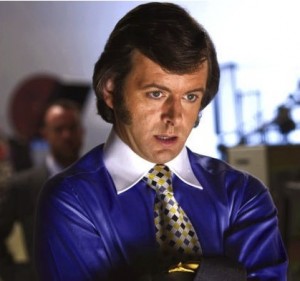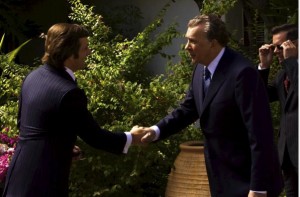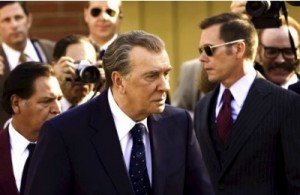Kitty Muggeridge once memorably observed that David Frost, the eponymous hero of Frost/Nixon, that he had “risen without trace”. People remember the gibe because it seems to capture the essence of the Frost phenomenon — the fact that he rose to great prominence in the world of broadcast television without ever appearing to have any real substance. As someone said in another context, “there’s no there there”.
Mrs Muggeridge’s crack came to mind a few weeks ago when watching the preview of Frost/Nixon, which went on general release in the UK yesterday. Based on a screenplay by Peter Morgan (who wrote the stage play of the same title which played at the Donmar Warehouse to rave reviews), it tells the story of how Frost — then a puffball chat-show host — negotiates an exclusive deal for a series of four two-hour TV interviews with Richard Nixon after the latter’s resignation following revelations about his involvement in the cover-up of the Watergate burglary. If Nixon had not resigned when he did, he would have been impeached by Congress. He was clearly guilty of what in the Uk would be called conspiracy to pervert the course of justice, and he ought to have gone to gaol. But he was (scandalously) granted an unconditional pardon by his successor, the genial but dim-witted Gerald Ford.
For those who were serious about politics (and for a large segment of the US electorate) Nixon’s escape from justice was an outrage, made worse by the fact that the culprit failed to admit either guilt or remorse. Frost — then languishing as the host of wacky, down-market freak-cum-celebrity chat-shows for the Australian market — seemed immune to such emotions: what obsessed him was the idea that landing an exclusive deal with Nixon offered the possibility of hitting the media jackpot. (There’s a sequence showing him thoughtfully watching the footage of Nixon’s final hours in the White House and then saying to an assistant “get me the numbers on this” — meaning the audience figures.) But to help him prepare for the ordeal, he hired a team which included John Birt (then a successful current affairs producer, later a controversial Director-General of the BBC), together with a grizzled political journalist and a young academic whose prime aim in life was to put Nixon behind bars.
For Nixon and his entourage, glowering resentfully in his Californian retreat at San Clemente, the prospect of an extended interview with a guy who had never done serious political interrogation offered a way for Nixon to get over his side of the story. (His advisers would never have allowed him to submit to interrogation by hard-boiled US newsmen).
Thus both sides came to the encounter with divergent expectations. The dramatic drive of the film derives from the fact that for most of the time Nixon ran rings around Frost, who was out of his depth and indeed for much of the time seemed slightly detached what was going on. (Some of the detachment was understandable — he was frantically trying to put together the finance needed to fund the series. But part of it was testosterone-driven — he was screwing a gorgeous brunette he had picked up on the transatlantic flight.) But in the end he was pressured by his back-up team to pull himself together and eventually extracted from Nixon an extraordinary sequence in which the former president expressed something close to remorse and extressed expressed the view that whatever the President of the United States does cannot, by definition, be illegal (a doctrine later embraced enthusiastically by the Cheney/Bush regime). So, in the end, the tension implicit in the plot — will Nixon be allowed to get away with it? — is resolved.
In an interview after the preview, Peter Morgan was asked whether he had taken any liberties with the facts of the story. He replied that he had exercised dramatic licence in two areas. Firstly, he had invented a late-night telephone call in which a drunk or doped (it’s not clear which) Nixon telephones Frost; this plays a pivotal role in the plot because it makes Frost realise that he will become a global laughing stock unless he can pull a substantial rabbit out of the hat in the final interview. The second exercise of dramatic licence came from putting Nixon’s dramatic admissions in the last interview, whereas in fact they came earlier in the four-day marathon. But neither of these liberties seemed unreasonable to me. Nixon was well-known for late-night incoherent phone calls. And the critical admissions were made, even if they had come earlier in the original narrative.
 The film has a couple of distinguished performances. Michael Sheen gives a very good rendition of Frost’s unique blend of superficial plausibility and subterranean vacuity. Deep down, you feel, the man is shallow. In that context it’s worth remembering that Sheen’s last memorable role was as Tony Blair in The Queen (also written by Peter Morgan). Could it be, one wonders, that the two men have something important in common? I mentioned this at dinner last night to a journalist who had just returned from a Middle-Eastern tour which had included attending a press conference given by Blair. It all sounded, my guest said, very plausible and impressive. But when he got back to his hotel room and began to type a report about what Blair had said he found himself stuck. Why? Because actually there turned out to be little substance in the ex-Prime Minister’s remarks; it was “all fluff”. There was “no there there”, as it were.
The film has a couple of distinguished performances. Michael Sheen gives a very good rendition of Frost’s unique blend of superficial plausibility and subterranean vacuity. Deep down, you feel, the man is shallow. In that context it’s worth remembering that Sheen’s last memorable role was as Tony Blair in The Queen (also written by Peter Morgan). Could it be, one wonders, that the two men have something important in common? I mentioned this at dinner last night to a journalist who had just returned from a Middle-Eastern tour which had included attending a press conference given by Blair. It all sounded, my guest said, very plausible and impressive. But when he got back to his hotel room and began to type a report about what Blair had said he found himself stuck. Why? Because actually there turned out to be little substance in the ex-Prime Minister’s remarks; it was “all fluff”. There was “no there there”, as it were.
The other memorable performance is by Frank Langella as Nixon. Although he doesn’t look quite right in the role (he’s physically bulkier than Nixon), he’s about the right age, and that matters. And he really gets inside the strange perverted psyche of his subject to give a performance that, while not diminishing one’s dislike of Nixon, at least gives an insight into how he came to be the man he was. (The ‘invented’ phone call is partly a rant by Nixon about the way he — like Frost — has always been an outsider, always patronised by the Ivy League crowd.)
I found Frost/Nixon both riveting and thought-provoking. The trailer is here, if you’re interested. It’s had five Oscar nominations.


